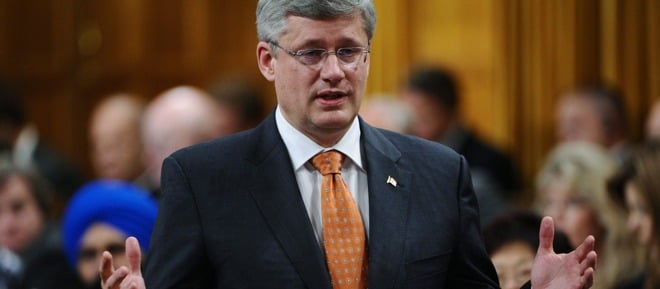The Commons: The faint sound of disagreement
The era of decorum achieves total farce
Share
 The Scene. The Prime Minister stood and congratulated the leader of the opposition on his election. The leader of the opposition congratulated the Prime Minister on his election. In his front row seat, Tony Clement wrapped his arms around himself and mimed a hug to celebrate this new spirit of mutual appreciation.
The Scene. The Prime Minister stood and congratulated the leader of the opposition on his election. The leader of the opposition congratulated the Prime Minister on his election. In his front row seat, Tony Clement wrapped his arms around himself and mimed a hug to celebrate this new spirit of mutual appreciation.
The civility that we were promised—and which everyone is now monitoring with the sort of close attention and nervous anticipation usually reserved for the rescue of Chilean miners or small children from holes in the ground—is now almost entirely insipid. Newly elected members and newly appointed ministers are applauded for simply existing. Everyone claps for everything and everyone. David Anderson was widely saluted today for apologizing after suggesting that a member opposite had made a “fool of himself.” It is like being in a kindergarten classroom where encouragement and self-esteem and positive affirmation are paramount.
This Decorous Era achieved total farce this afternoon when Conservative parliamentary secretary Shelly Glover thanked one of her opposition critics for their re-election. “Mr. Speaker, I want to thank my colleague once again for returning to this House,” Ms. Glover said of New Democrat Irene Mathyssen. Presumably she meant to congratulate. Hopefully we will soon enough be sufficiently reacquainted with each other that even that seems unnecessary.
In the meantime, this place remains mostly concerned with serious matters of public policy. And whatever this may lack in salaciousness, it does at least allow members of different parties to acknowledge their critical views of each other’s intentions.
First up was Jack Layton with a little thinly veiled sarcasm: suggesting that “as an economist,” surely Mr. Harper would understand the need to do more than reduce the corporate tax rate if he intended to nurture a well-rounded economy.
Er, hiyo!
When that failed to reduce the Prime Minister to tears, Mr. Layton went for more explicit admonishment. “Mr. Speaker, the Prime Minister has labelled his $17 billion in cuts to the budget over the next five years as modest. He said his critics are living in a fantasy world if they think that it will affect essential services,” the NDP leader prefaced. “What about the unemployed who cannot get the benefits that they need? Are they living in a fantasy world? What about the seniors who have seen their pensions disappear? Are they living in a fantasy world? What about families without family doctors? Are they living in a fantasy world?”
There were six questions here, but Mr. Layton had apparently not yet posed his actual query. “I have a simple question,” he explained. “What services will Canadians have to do without when the Prime Minister is finished his cuts?”
Mr. Harper assured that he intended only to cut “fat” and find “efficiencies.”
Peggy Nash went next and suggested that the government intended to “frighten” the population with this deficit issue. What’s more, she added, the Finance Minister could not be taken seriously (on account of how often his fiscal projections change). And his plans for corporate tax cuts were “reckless.”
The NDP onslaught did not end there. Wayne Marston suggested the government’s new pension initiative was “risky.” Pat Martin posited that Conservative plans for the Canadian Wheat Board were an “ideological crusade that defies reason, logic and even economics.” And Jack Harris exclaimed that a Conservative member’s alleged belief that higher unemployment might boost military recruitment was “unbelievable.”
To much of this, the government side was unmoved. Most questions of policy and national improvement, you see, have been answered by yesterday’s federal budget. Various other matters will be dealt with in due course. And there is little else you need bother your pretty little head with right now.
Those billions in spending cuts? You’ll barely notice. The expiration of federal-provincial health care accords in 2014? We’ve got lots of time.
“The health accord expires in 2014,” Health Minister Leona Aglukkaq explained to two of her opposition critics this afternoon, “not this year, not next year and not the year after.”
And so, especially in this new era of respectful public dialogue, surely everyone will understand that it would rude to expect her to say anything more for another two and a half years.
The Stats. The budget, 11 questions. Health care and regional economic development, four questions each. Seniors, three questions. Food safety, pensions, the Canadian Wheat Board, aboriginal affairs, crime, employment, the military and Quebec flooding, two questions each.
Shelly Glover, nine answers. Stephen Harper, five answers. Leona Aglukkaq and Diane Finley, four answers each. Pierre Lemieux, David Anderson, John Duncan, Rob Nicholson and Peter MacKay, two answers each. Jason Kenney, Alice Wong, Denis Lebel, Tony Clement, Lynne Yelich and Vic Toews, one answer each.